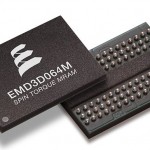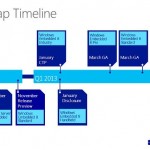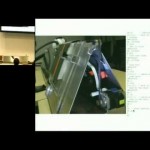XBMC 12.0 Frodo Beta Brings Live TV, PVR Support, and More to Your Media...
Windows/Mac/Linux/Others: XBMC is still our favorite customizable media center software around, and today you can download the beta of version 12.0 which adds live TV, PVR support, better AirPlay, and lots more to your home theater PC. More »
Google Engineers Open Source Book Scanner Design
c0lo writes "Engineers from Google's Books team have released the design plans for a comparatively reasonably priced (about $1500) book scanner on Google Code. Built using a scanner, a vacuum cleaner and various other components, the Linear Book Scanner was developed by engineers during the '20 percent time' that Google allocates for personal projects. The license is highly permissive, thus it's possible the design and building costs can be improved. Any takers?" Adds reader leighklotz: "The Google Tech Talk Video starts with Jeff Breidenbach of the Google Books team, and moves on to Dany Qumsiyeh showing how simple his design is to build. Could it be that the Google Books team has had enough of destroying the library in order to save it? Or maybe the just want to up-stage the Internet Archive's Scanning Robot. Disclaimer: I worked with Jeff when we were at Xerox (where he did this awesome hack), but this is more awesome because it saves books." Read more of this story at Slashdot.
Thieves Grab 3,600 iPad Minis Worth $1.5M In JFK Airport Heist
Apple’s iPad mini seems to be a success , and that has attracted the criminal element’s attention. According to the New York Post , a shipment of Apple’s iPad mini, numbering 3,600 devices and with a total value of $1.5 million, was taken from JFK airport from the same location that a group stole $5 million in cash and $900,000 in jewelry in 1978. The thieves apparently only got a fraction of their total target, since they had to leave three pallets behind when an airport worker returned from dinner and questioned their actions. Before that, however, they had already managed to grab two full pallets, which still adds up to $1.5 million in goods as mentioned above. Police suspect an inside job, but no suspects have been apprehended as of yet. The iPad minis had just reached the U.S. from Apple’s assembly partners in China, and were destined for delivery across the U.S. Apple is known to be shipping out its first batch of LTE iPad minis this week, so it’s possible this shipment was part of that rollout. If so, it’s possible that means 3,600 expectant Apple fans are going to be disappointed, but Apple could also very theoretically redirect stock destined for store shelves to make up the difference. The whole job was reportedly pulled off by just two guys. Fencing the stolen goods might be difficult, since posting an ad on Craigslist for 3,600 iPads might look a little suspicious, but it’s still a remarkable take for a couple of guys who apparently just drove a truck to the airport.
Simple Router Software Could Boost Public Wi-Fi Throughput By 700 Percent
Using public Wi-Fi is a hit-and-miss endeavor: sometime's its perfect, at others it's bogged down so much as to be worthless. Fortunately a team of researchers has hit on a solution that can improve throughput by 700 percent —and because it's software-based, it won't even need any new hardware to have us all contentedly online. More »
LTE: fast, global, silenced by a $650 radio jammer
Oh gosh, we haven't been so panicked since our phones were hypothetically possessed by demons . And come to think of it, this is theoretically far, far worse. A research group at Virginia Tech is claiming that, due to the particular way 4G data is transmitted, an LTE base station can be sabotaged using lightweight equipment that costs as little as $650. Such a thing is possible because, unlike 2G and 3G, LTE depends on control instructions that occupy only a tiny fraction of the total signal -- and details of those specific frequencies have been openly published. According to the research group's director, Jeff Reed, a single malicious operative with a hot briefcase and a bit of know-how could take down "miles of LTE signals." If the attacker splashed out on an amplifier, they could cut off reception for thousands of people across a whole city or region. Reed stresses that there are no known instances of this happening yet, but also warns that he can see no "mitigation strategies" that can "cover it all." Let us pray that humanity's characteristic inability to agree on anything -- including a universal LTE standard -- will be our salvation. Filed under: Cellphones , Wireless , Science , Mobile LTE: fast, global, silenced by a $650 radio jammer originally appeared on Engadget on Thu, 15 Nov 2012 07:32:00 EDT. Please see our terms for use of feeds . Permalink | Technology Review | Email this | Comments
Apple to dole out $2.5 billion to shareholders
Making good on its dividend program plans, the tech giant chips away at a $45 billion pile of cash and hands out some legal tender to its shareholders. [Read more]
Everspin throws first ST-MRAM chips down, launches commercial spin-torque memory era
Who says scientific breakthroughs never amount to anything? Everspin has followed up on research developed by IBM, TDK and German researchers years back and released the first commercial spin-torque magnotoresistive RAM (ST-MRAM) onto the market. The technology works by taking advantage of electron "spin" to store data in a magnetic, rather than electronic state, providing non-volatile memory that doesn't wear out. The company said the first chips were about 50 times the cost of flash memory by size, but where a typical NAND module can perform about 800 iOPS, ST-MRAM is capable of 400,000 -- making it ideal for SSD caching and other demanding applications. Everspin has started shipping working samples of the 64MB DIMMS in a DDR3 form factor, saying that future versions will scale to gigabyte capacities and faster speeds -- keeping Moore's Law hurtling inexorably forward. Check the PR after the break for the company's spin on it. Continue reading Everspin throws first ST-MRAM chips down, launches commercial spin-torque memory era Filed under: Peripherals , Storage Everspin throws first ST-MRAM chips down, launches commercial spin-torque memory era originally appeared on Engadget on Wed, 14 Nov 2012 12:50:00 EDT. Please see our terms for use of feeds . Permalink Computerworld | | Email this | Comments
How a tiny eye implant could save your vision from glaucoma
Stents have long been used in medicine for keeping blocked arteries open, along with various other tubes of the body that are prone to blockage and collapse. Now, this same concept has been shrunk down to a minute size, and might soon be finding a home in your eyeballs. More »
Microsoft reveals Windows Embedded 8 and Windows Embedded Compact 2013 road map
You, the consumer, probably don't care too much about Windows Embedded 8 and Windows Embedded Compact 2013. But businesses and OEMs, they're pretty psyched. The next generation of Microsoft's light-weight OS offerings will bring the improved touch and gesture support of Windows 8 to low power platforms like car computers and kiosks. In all five versions of Windows Embedded 8 will be available: Standard , Pro, Industry, Automotive and Handheld. The latter of which is built around Windows Phone 8 as opposed to the desktop system. The Industry and Handheld editions are expected to land in January, with Pro and Standard to follow in March. Compact 2013 doesn't have a solid release window yet beyond Q2 of 2013. If you're an impatient builder of connected devices you can download a release preview of Windows Embedded 8 Standard at the more coverage link. Continue reading Microsoft reveals Windows Embedded 8 and Windows Embedded Compact 2013 road map Filed under: Software , Microsoft Microsoft reveals Windows Embedded 8 and Windows Embedded Compact 2013 road map originally appeared on Engadget on Wed, 14 Nov 2012 10:32:00 EDT. Please see our terms for use of feeds . Permalink | Microsoft | Email this | Comments
Open Source Book Scanner Uses a Household Vacuum To Turn the Page
In an effort to streamline the process of scanning hundreds of millions of titles, Google Books engineer Dany Qumsiyeh has designed a $1,500 automated scanner from sheet metal, dissected electronics, and a household vacuum. It can chew through a 1,000 page odyssey in about 90 minutes, and you're welcome to build your own since Qumsiyeh has made his Linear Book Scanner open source . More »













